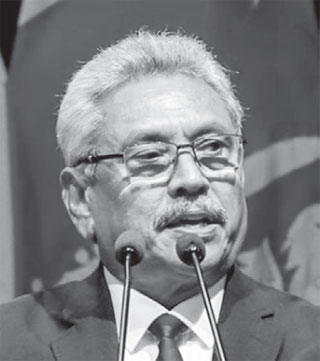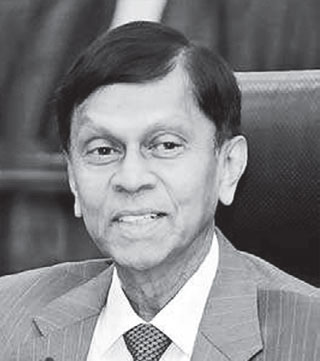Tuesday Feb 17, 2026
Tuesday Feb 17, 2026
Saturday, 20 November 2021 00:00 - - {{hitsCtrl.values.hits}}
 At last, the Governor of Central Bank and his team of experts have come to realise the truth that excess money supply, either through printing currency or reducing interest rates, in the name of providing adequate liquidity to maintain aggregate demand in times of economic depression, has only a limited use.
At last, the Governor of Central Bank and his team of experts have come to realise the truth that excess money supply, either through printing currency or reducing interest rates, in the name of providing adequate liquidity to maintain aggregate demand in times of economic depression, has only a limited use.
In general terms, the traditional tools of monetary policy have lost their bite long ago, when money itself has undergone a revolution in identity. With the onset of globalisation, spurred by financialisation of economic activities and facilitated by the electronic revolution in money market transactions, central banks have become virtually an anachronism.
When an institution that is supposed to manage a country’s money supply, finds it difficult to define and identify what money is how could that institution control money supply? Even then, with its limited capacity to manage that supply and monitor money market activities, it can at least use its constitutionally accorded independence, to neutralise the damaging impacts of politically motivated economic policies of governments in power.
When a central bank mortgages that independence and act as another administrative arm to carry out the diktats of an executive power then that bank loses its credibility also. This has what happened in the case of the Central Bank of Sri Lanka (CBSL).
One should not forget in this context, the so-called discussion that the CBSL Governor and his colleagues had with President Gotabaya Rajapaksa (GR) soon after the present Governor of the bank was appointed. The President was pointedly virtually dictating to the monetary authorities to assist in implementing “my”, i.e., GR’s economic policies. On that day, the CBSL virtually lost its independence and literally became the Government’s bank.
 |
| President Gotabaya Rajapaksa |
 |
| CB Governor Ajith Nivard Cabraal
|
The pandemic provided a good opportunity to demonstrate its cooperation with GR and CBSL went to the printing machine and worked overtime to flood the market with currency. The inflationary effect of this exercise was casually ignored or deliberately minimised by subtracting food inflation from calculation.
Expenditure on food consumes the largest percentage in the income of a vast majority of ordinary householders. The exclusion of this item in the calculation of inflation is to camouflage the truth. Moreover, investors know that the interest they earn on their bank deposits is lower than the prevailing inflation rate, and they will therefore park their savings beyond the reach of tax authorities. This means growth of a black economy. Didn’t CBSL itself encourage earlier owners of ill-gotten wealth lying abroad to be brought in without questions being asked?
As a result of CSBL’s liquidity exercise, rupee depreciated, current account deficit ballooned, government revenue fell, cost of living sky rocketed, demand for higher pay from public servants became louder, and the economy went into a tailspin. In desperation, CBSL is now forced to tighten its monetary policy. It is too little and too late.
What the country needs by way of economic revival is not a set of patchwork remedies born out of a President’s thought bubbles, but a structured and comprehensive approach to stop the economy shrinking further into the abyss and approaching bankruptcy. This cannot be achieved simply by fine-tuning monetary tools and implementation of presidential diktats, but through a wide range of measures linked to all sectors of the economy.
In short, it needs an economic plan drafted by a team of experienced economists and policy makers to be translated into action by honest administrators. It may also need changes in other policies too, like in foreign affairs. Such an approach should have been undertaken at the very beginning of the pandemic outbreak.
The Government, which ignored advice from epidemiology experts. did obviously underestimate the duration and severity of this virus. Placing its trust on the advice of quasi-scientists and bogus remedies the regime adopted a stop-go approach supervised by the military. It is the same approach it is adopting towards the economy also. As a result, the country is experiencing the compound effects of a double tragedy. Is this the long-touted alternative path the President promised for prosperity?
Apart from the mishandling of the pandemic and the economy, there are also other issues such as human rights violations, failure to investigate the Easter bombing tragedy and to catch the mastermind behind it, rule of injustice and widespread corruption, only to name a few. Pressure is mounting internationally urging the Government to address some of those issues.
It looks that the people are ready for a change but the Opposition is not ready with an alternative agenda for masses to rally behind. In the meantime, the recent Cabinet reshuffle, which neither did weed out the incompetent nor injected any new blood into it, ended in allocating yet more portfolios to members of the first family.
Opposition to this mismanagement is mounting. Public protests, even in the face of lockdowns, are everywhere to see. Unfortunately, there seems to be no coordination and cohesion within the opposition. This is an additional calamity.
There is however, one fear lurking round the corner which may take the country totally in a different direction. The President has already declared his intention to run for a second term, and in his latest address to the nation he has warned the people to be ready for more sacrifices. He did not spell out what those sacrifices going to be.
By way of economic comfort, the masses have already sacrificed more than what they could bear. In terms of democratic rights and freedom there is already a de facto military regime under an executive president. With all this, if the regime continues to face popular discontent, loses the confidence of even those who voted the regime to power, and is not prepared to go for a fresh mandate from the people before the end of its first term then, the only option available for it to continue is to rule militarily.
It will be looking for a provocation to unleash the military and there are enough ultra-Buddhist elements waiting in the wings to give the regime a helping hand.
(The writer is attached to the School of Management & Governance, Murdoch University, Western Australia.)